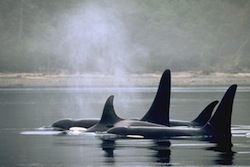What do Orca whales and solar energy have in common? Nothing until now. Canadian Solar Solutions has donated solar modules to power the OrcaLab Whale Research Centre, on a remote island off the British Columbia coast near Alert Bay. OrcaLab has been recording the Johnson Strait whales for more than four decades. Founder, Dr. Paul Spong and his wife Helena Symonds have spearheaded global research that confirms orca “clans” have distinct, highly sophisticated dialects. This  scientific evidence in turn has led to bans against commercial orca hunting, and to the creation of nearby orca sanctuaries.
scientific evidence in turn has led to bans against commercial orca hunting, and to the creation of nearby orca sanctuaries.
“The solar installation is performing beyond our expectations,” said Dr. Paul Spong a whale expert and advocate. “We are now running all of our power needs without a generator, and looking forward to a future here without oil. We are so grateful to Canadian Solar for everything they have done for us.”
According to Canadian Solar Solutions, a subsidiary of Canadian Solar, the new donated solar system allows the off-grid OrcaLab to cut gas generator use and fuel costs dramatically, increase battery performance and life, expand the range of microphones and cameras, and improve amenities for summer volunteers. The system is designed to perform with minimal maintenance for several decades. In addition, the panels will power the main OrcaLab site, and a network of underwater microphones and cameras which will track migrating orca whale and other marine animals.
“We are honored to be involved in the ground breaking OrcaLab foundation’s noble orca whale research,” said Shawn Qu, chairman and CEO of Canadian Solar. “We are proud to be able to help advance the team’s ambitious work through this latest exciting application of solar energy. As an industry leader, Canadian Solar strives to also lead in our philanthropic efforts with organizations around the world.”

